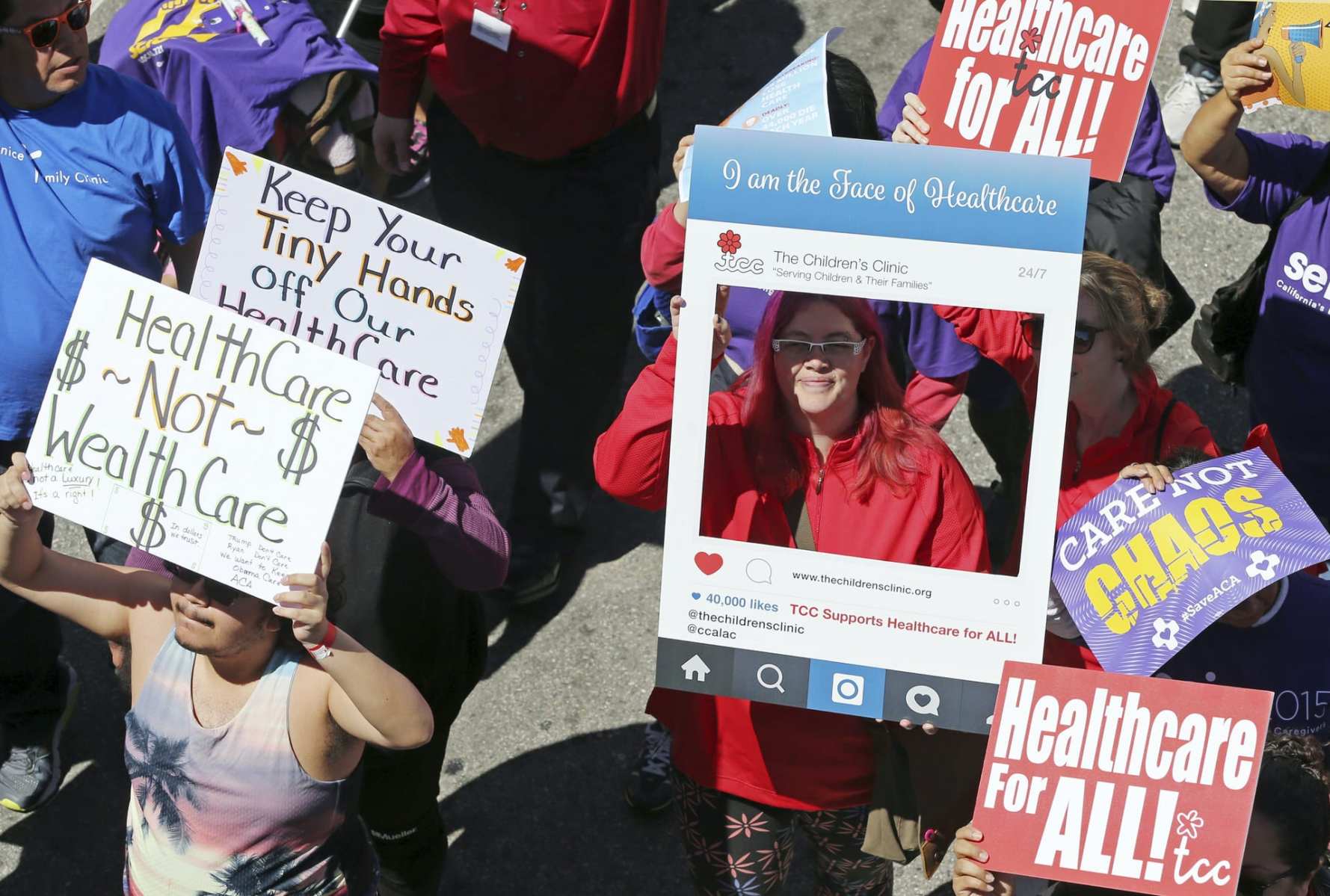Two years ago, women voters drove Democrats to take back the House of Representatives in a so-called “blue wave.” Their top concern? Health care.
That 2018 midterm came on the heels of Republicans’ repeated failed attempts to overturn the Affordable Care Act, Barack Obama’s signature health law. After those repeal efforts, the once-controversial law gained favorable ratings from the majority of Americans, giving Democrats a winning message about maintaining its health care protections. That message landed with women — specifically, White women from ages 30 to 64 who identified as Democrats and liberal independents — and fueled the party’s largest gain of House seats since 1974.
Now, with Election Day less than a month away, a Supreme Court confirmation looming, and a pandemic that’s claimed more than 210,000 lives, those same voters could play a critical role in determining who is inaugurated come January. The stakes couldn’t be higher for them.
Since 2016, President Donald Trump has vowed to repeal the Affordable Care Act. Now, the likely confirmation of Amy Coney Barrett as the Supreme Court’s ninth justice increases the odds that the health law would be struck down in California v. Texas, which is slated to be argued before the court Nov. 10.
Women are more likely than men to support the Affordable Care Act, per recent polling by The New York Times and Siena College Research Institute. Another poll, run at the end of September by the Morning Consult, found 92 percent of women said maintaining and expanding upon the Affordable Care Act was “very important” or “somewhat important” in shaping their vote this year.
Meanwhile, a September survey across 10 battleground states — including Arizona, Florida, Georgia, Michigan, Minnesota, North Carolina, Texas and Wisconsin — found that women were significantly more likely to say maintaining protections for preexisting conditions would play a critical role in shaping their vote.
Women also were more likely to believe Joe Biden would do a better job maintaining health care protections and addressing the coronavirus crisis.
“When it comes to health care in general, making sure people have affordable access and making sure the government is working to help people … women consistently want those things more than men,” said Mary Kay Lizotte, a political scientist at Augusta University who focuses on women and health care. “A lot of that is driven by women being more likely to be Democrats. But that’s not the whole story.”
Women are more likely to earn less than men, meaning health care expenses can pose a greater burden. They typically use more health care. Research shows they are more likely to skip out on medications because of the price. They are more likely to take care of older, sicker relatives. And of the nation’s current uninsured population, women are more likely to say they lack coverage because they can’t find an affordable option.
Still, Biden and Trump both have spent little campaign time on how, specifically, they intend to address the gendered impact of health care. Trump has promised to protect people with preexisting conditions — while also saying he intends to get rid of the ACA — but has laid out no plan for how to achieve the former goal.
Biden has made more frequent mention of the ACA, specifically since Barrett’s nomination. At the first presidential debate, he noted its specific protections against gender-based discrimination, and has touched on that theme in some recent stump speeches. (Prior to the health law’s passage, women — who are more likely to have preexisting conditions — were often charged higher premiums for insurance than men were. Being transgender was also considered a preexisting condition.)
Still, Biden has placed far less emphasis on his own health care plan, despite health reform emerging as a central issue in the Democratic primary, and his own proposal to expand insurance coverage through a government-backed “public option” and more generous subsidies for people buying private insurance. Those are proposals that experts say could disproportionately affect women. But the message isn’t necessarily getting through.
“It feels like, at this point, they’re just putting more support under the Affordable Care Act, and not necessarily looking at bettering it, reexamining it, ensuring its success — because it has issues,” said 49-year-old Jody Delikat, who lives in Madison, Wisc.
An independent and evangelical Christian, Delikat has voted across parties all her life. Four years ago, she wrote in a vote for John Kasich, the former governor of Ohio who vied for the Republican nomination in 2016.
Delikat has no love for Trump, she said, and protecting people with preexisting conditions is one of her top priorities this year. Her daughter has lupus, an autoimmune disorder, and Delikat knows several other friends who similarly rely on ACA protections. She doesn’t believe Trump has a replacement plan for the health law if it is somehow undone, and she’s frustrated with how the administration has handled COVID-19.
Voters like Delikat are the type the Biden campaign is placing its bets on — mostly independent women in states that are still up-for-grabs, and who may not have voted for Hillary Clinton four years ago, but who aren’t happy with the current administration. Indeed, polling suggests Biden is increasingly winning over these voters.
But though she’s leaning toward Biden, Delikat is still waiting to hear more on the issue that matters most to her: how a Biden administration would actually improve American health care. For Delikat and women like her, the current system still isn’t working — problems persist that the ACA didn’t solve.
“It’s like they’re playing defense, and I would like to know more about their vision for the future,” she said.
Just two years ago, 30.1 million women had preexisting conditions that, if not for the ACA, would have left them entirely unable to buy individual coverage — significantly more than the 23.7 million men in the same boat.
For Debra Kinkaid, who lives in Kansas, health care is a critical election issue. Her children have complex mental health care needs. Her sister has had multiple forms of cancer. She herself has had a hip surgery, and, as a teenager, was diagnosed with irritable bowel syndrome as well as multiple complex mental health conditions.
Without the ACA, health insurance simply wouldn’t be an option for her, or for the people she loves. But it also isn’t enough. Her mother, who is on Medicare, often goes without needed medications because they’re too expensive. Her sister’s mouth prosthetic — which she needed after a surgery so she could eat and speak properly — wasn’t covered by insurance because it was deemed cosmetic, Kinkaid said.
Meanwhile Kinkaid’s son, who has autism, struggles to eat because of sensory overload. They found a psychiatrist who can help. But her family’s complicated insurance set-up — Kinkaid has Medicaid, but her ex-husband’s private insurance functions as their son’s primary coverage — means that each session would have cost them hundreds of dollars, the doctor told her.
“I can’t afford it. It’s infuriating,” she said.
Kincaid, 43, didn’t vote in 2016. She said she’s planning to vote for Biden, citing health care as the reason. She trusts him on the issue, she said. Still, in some ways, she’s taking a gamble — she knows things need to be better, but she doesn’t know how, precisely, he’d address problems like hers.
“I know he wants to expand on what Obama did,” she said. “I would pray that means he would make it even better.”
Polls suggest Biden is leading Trump among White women. But even among women who benefited from the health law, and would stand to lose coverage if it’s struck down, there is still support for the president.
Michelle Gile, a former Clinton voter who lives in Arizona, has landed on voting for Trump. Biden’s current message of “preserving preexisting conditions” isn’t resonating with her, she said. The tagline is too similar to what Democrats ran on previously, and she isn’t hearing anything new.
Gile, 56, likely has insurance because of the ACA. She lost her job in the pandemic, and is now covered through Medicaid, for which Arizona expanded eligibility in 2014. That insurance helped her get a recent shoulder surgery. Even so, her new coverage isn’t factoring in her vote, she said. Prior to speaking with The 19th, she hadn’t realized Trump’s platform plans would ultimately eliminate that source of insurance.
“I guess if it would affect me, I didn’t pay attention to it,” she said.
As for COVID-19, men and women now appear about equally likely to weigh the pandemic as a major factor in shaping their votes. But women concerned about the outbreak are more likely to believe a Biden presidency would address their worries, at least compared to a second Trump term.
Women, especially Black and Latina women, are more likely to be on the frontlines of the pandemic, working as health care providers or in other essential services. In general, women have accounted for more cases of the virus than men, even if they are far less likely to go to the hospital or die. They are carrying a disproportionate psychological burden as well.
And without the ACA, both a history of COVID and histories of mental health problems could be counted as preexisting conditions — another burden women voters are navigating.
“The whole idea of preexisting conditions is part of my concern for COVID, because we don’t know what the long-term impact on people’s health is,” said Ann Ranson, a 68-year-old independent voter in Dallas. “Should preexisting conditions become an issue, and COVID creates preexisting conditions — oh my God, what a disaster that would be.”
Those concerns are what drove Paula Fierros, a first-time voter in Tucson, Arizona, to finally settle on Biden. To her mind, “neither is better than the other.” But Trump, she said, hasn’t “handled the coronavirus in a responsible way.” That’s a deal-breaker for her.
Fierros, 20, is a waitress at a casino. Since coming back to work, she’s seen her income drop by hundreds of dollars — the tips she relies on just aren’t coming in. She isn’t worried about her own health, she said, but that of her customers.
Many regulars, especially older ones, have simply disappeared. She isn’t sure if they’re still alive, or if they’ve died of the virus. Her sister recently contracted COVID-19, though she’s since recovered.
“A lot of people in the Republican Party say, ‘Just go with your day-to-day lives.’ It’s not the safest and most considerate way of [treating] other people,” she said. “There’s been a lot of numbers of deaths. But people ignore the numbers.”
Still, even after the pandemic, health care will remain an issue for her, she said. Like millions of other American women, Fierros has several family members with preexisting health conditions — high blood pressure and heart conditions. Without at least the ACA, she said, she doesn’t know how they’d get medical care they need.
Even now, with the law intact, she said, health care access remains a challenge. One example: a recent visit Fierros and her mother took to the pharmacy, to pick up her mother’s prescription. With insurance, the co-pay usually came to about $25, Fierros recalled. But this time? It was $53.
Fierros couldn’t believe it.
“How is that possible?” she said. “If we get rid of the ACA, I’m scared she’s not going to be able to afford her own medication. A lot of people have diabetes, and won’t be able to afford insulin, which they need. It’s really worrisome.”





